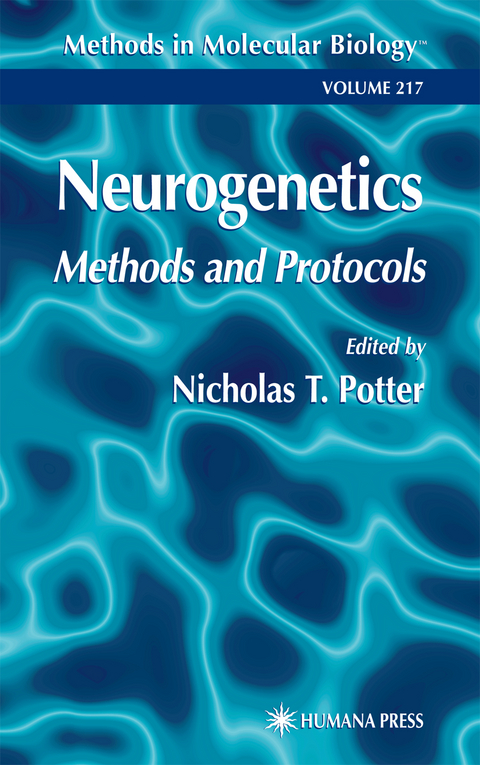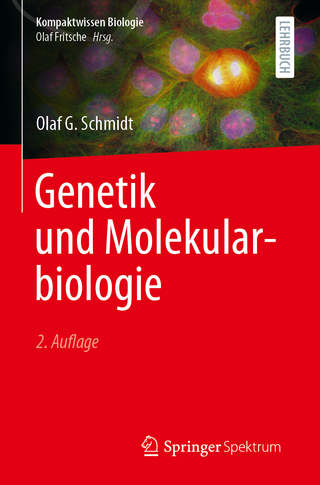
Neurogenetics
Humana Press Inc. (Verlag)
978-0-89603-990-2 (ISBN)
The rapid identification and characterization of genes of neurological relevance holds great potential for offering insight into the diagnosis, management, and und- standing of the pathophysiologic mechanisms of neurological diseases. This volume in the Methods in Molecular Biology™ series was conceived to highlight many of the contemporary methodological approaches utilized for the characterization of neu- logically relevant gene mutations and their protein products. Although an emphasis has been placed upon descriptions of methodologies with a defined clinical utility, it is hoped that Neurogenetics: Methods and Protocols will appeal not only to clinical laboratory diagnosticians, but also to clinicians, and to biomedical researchers with an interest in advances in disease diagnosis and the functional consequences of neu- logically relevant gene mutations. To meet this challenge, more than 60 authors graciously accepted my invitation to contribute to the 32 chapters of this book. Through their collective commitment and diligence, what has emerged is a comprehensive and timely treatise that covers many methodological aspects of mutation detection and screening, including disc- sions on quantitative PCR, trinucleotide repeat detection, sequence-based mutation detection, molecular detection of imprinted genes, fluorescence in situ hybridization (FISH), in vitro protein expression systems, and studies of protein expression and function. I would like to take this opportunity to formally thank my colleagues for their effort and dedication to this work.
Quantitative PCR.- Determination of Gene Dosage.- Semiquantitative PCR for the Detection of Exon Rearrangements in the Parkin Gene.- Trinucleotide Repeat Detection.- Detection of FMR1 Trinucleotide Repeat Expansion Mutations Using Southern Blot and PCR Methodologies.- Extreme Expansion Detection in Spinocerebellar Ataxia Type 2 and Type 7.- Repeat Expansion Detection (RED) and the RED Cloning Strategy.- Repeat Analysis Pooled Isolation and Detection (RAPID) Cloning of Microsatellite Expansions.- DIRECT Technologies for Molecular Cloning of Genes Containing Expanded CAG Repeats.- Antibody-Based Detection of CAG Repeat Expansion Containing Genes.- Detection of Trinucleotide Repeat Containing Genes by Matrix-Assisted Laser Desorption/Ionization (MALDI) Mass Spectrometry.- Fluorescence PCR and GeneScan® Analysis for the Detection of CAG Repeat Expansions Associated with Huntington’s Disease.- Sequence-Based Mutation Detection.- Molecular Detection of Galactosemia Mutations by PCR-ELISA.- Denaturing High-Performance Liquid Chromatography and Sequence Analyses for MECP2 Mutations in Rett Syndrome.- Multiplexed Fluorescence Analysis for Mutations Causing Tay-Sachs Disease.- Single-Strand Conformational Polymorphism Analysis (SSCP) and Sequencing for Ion Channel Gene Mutations.- Pulse Field Gel Electrophoresis for the Detection of Facioscapulohumeral Muscular Dystrophy Gene Rearrangements.- Denaturing Gradient Gel Electrophoresis (DGGE) for Mutation Detection in Duchenne Muscular Dystrophy (DMD).- Genetic Diagnosis of Charcot-Marie-Tooth Disease.- Analysis of Human Mitochondrial DNA Mutations.- Detection of Mitochondrial DNA Mutations Associated with Leber Hereditary Optic Neuropathy.- Molecular Detection of Imprinted Genes.- PCR-Based Strategies for the Diagnosis ofPrader-Willi/Angelman Syndromes.- Fluorescence In Situ Hybridization (FISH).- Fluorescence In Situ Hybridization (FISH) for Identifying the Genomic Rearrangements Associated with Three Myelinopathies.- In Vitro Expression Systems and Studies of Protein Expression and Function.- Drosophila Models of Polyglutamine Diseases.- A Comparative Gene Expression Analysis of Emery-Dreifuss Muscular Dystrophy Using a cDNA Microarray.- The COS-7 Cell In Vitro Paradigm to Study Myelin Proteolipid Protein 1 Gene Mutations.- In Vitro Expression Systems for the Huntington Protein.- Heterologous Expression of Ion Channels.- An Assay for Characterizing In Vitro the Kinetics of Polyglutamine Aggregation.- Characterization of Prion Proteins.- Detection of NF1 Mutations Utilizing the Protein Truncation Test (PTT).- Application of the Protein Truncation Test (PTT) for the Detection of Tuberosis Sclerosis Complex Type 1 and 2 (TSC1 andTSC2) Mutations.- Development and Characterization of Antibodies that Immunoprecipitate the FMR1 Protein.- Immunological Methods for the Analysis of Protein Expression in Neuromuscular Diseases.
"This book provides detailed laboratory methods in its of 32 chapters. Each chapter provides sufficient detail to allow the duplication of the laboratory method. The emphasis is on neurogenetic diseases and the methods are all molecular biological including PCR, DNA sequencing, Western Blot, and Southern Blot. Diseases covered include Huntington's disease, Charcot-Marie-Tooth, Rett's Syndrome, Leber's Optic Atrophy, spinocerebellar ataxias, Parkinson's disease, and neurological mitochondrial diseases.. This is a unique and highly useful book that details laboratory methods in more detail than any comparable book. Laboratory scientists and investigators who wish to use neurogenetic laboratory methods to study these disorders will find great value in this compendium of methodologies."-Doody's Health Sciences Book Review Journal
| Erscheint lt. Verlag | 9.10.2002 |
|---|---|
| Reihe/Serie | Methods in Molecular Biology ; 217 |
| Zusatzinfo | XIII, 390 p. |
| Verlagsort | Totowa, NJ |
| Sprache | englisch |
| Maße | 178 x 254 mm |
| Themenwelt | Medizin / Pharmazie ► Medizinische Fachgebiete ► Neurologie |
| Studium ► 2. Studienabschnitt (Klinik) ► Humangenetik | |
| Naturwissenschaften ► Biologie ► Humanbiologie | |
| ISBN-10 | 0-89603-990-0 / 0896039900 |
| ISBN-13 | 978-0-89603-990-2 / 9780896039902 |
| Zustand | Neuware |
| Haben Sie eine Frage zum Produkt? |
aus dem Bereich


